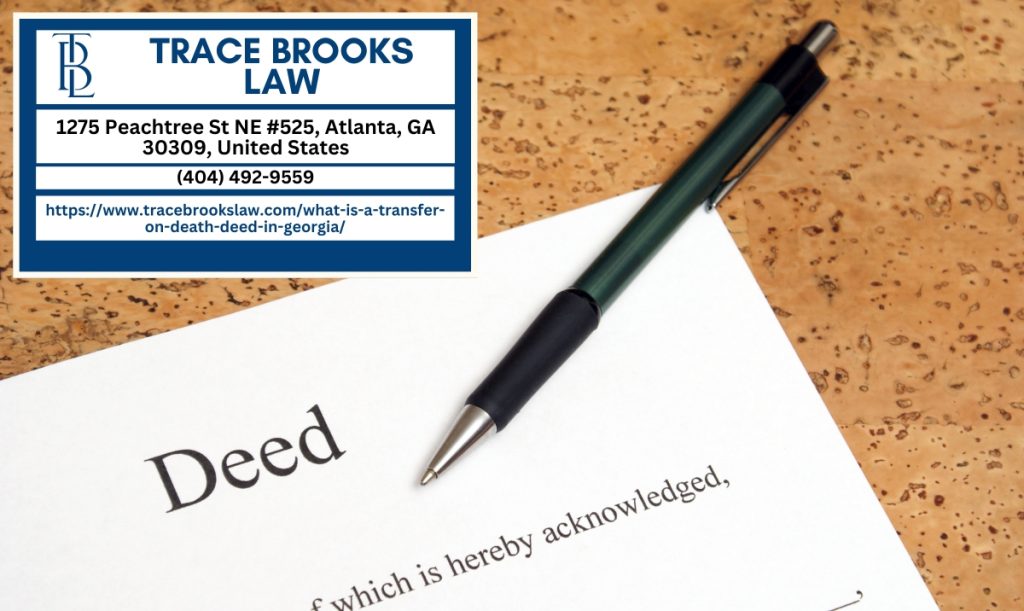A Transfer on Death (TOD) deed is an increasingly popular tool in estate planning that simplifies the transfer of real estate to a designated beneficiary upon the owner’s passing. This type of deed allows property owners to retain full control over their property during their lifetime while avoiding the time-consuming and costly probate process. For Georgia residents, the recent introduction of TOD deeds provides a new, efficient way to manage real estate within an estate plan. Understanding how TOD deeds work and their potential benefits can help individuals make informed decisions about their estates.
At Trace Brooks Law, our experienced Atlanta estate planning attorneys can guide you through the process of creating a Transfer on Death deed that fits seamlessly into your broader estate plan. From drafting and filing the deed to addressing any questions about your property rights, our team is here to help ensure your goals are met with clarity and precision. Contact us today at (404) 492-9559 to explore how we can assist in securing your estate and simplifying the future transfer of your assets.
Understanding Transfer on Death Deeds
A Transfer on Death (TOD) deed is a valuable estate planning tool recently introduced in Georgia. It enables property owners to designate a beneficiary who will automatically inherit their real estate upon their death, bypassing the often lengthy and costly probate process. This direct transfer of ownership streamlines the process for heirs while allowing property owners to retain full control over their property during their lifetime.
Legal Status of Transfer on Death Deeds in Georgia
Georgia has historically not recognized Transfer on Death deeds, which limited the options available for property owners seeking to simplify their estate plans. This changed with the enactment of House Bill 1247 during the 2023-2024 legislative session. Signed into law by the governor, the bill took effect on July 1, 2024, introducing TOD deeds as a new tool under Georgia Code § 44-17-2.
The new legislation allows Georgia property owners to transfer real estate directly to a named beneficiary upon their passing, without the need for probate court involvement. Through the adoption of TOD deeds, Georgia joins other states in recognizing the efficiency and practicality of this approach. This change reflects a broader effort to modernize estate planning laws in Georgia, offering residents a simpler, more cost-effective method for passing on real property to their heirs.
For those looking to simplify estate planning in Georgia, understanding Transfer on Death deeds can be a strategic decision. If you’re considering this option or have questions about how it fits into your estate plan, consulting with an experienced Atlanta estate planning attorney can provide tailored guidance and help ensure your property is transferred according to your wishes.

Eligibility Requirements for Transfer on Death Deeds
In Georgia, the introduction of Transfer on Death (TOD) deed provides property owners with a new estate planning tool to streamline the transfer of real estate upon death. However, specific eligibility criteria must be met to create a valid TODD.
Who Can Create a Transfer on Death Deed in Georgia?
Any person who is legally competent and owns real estate in Georgia is eligible to create a Transfer on Death deed. The property owner must have a clear title to the property, ensuring there are no unresolved ownership disputes or liens that could complicate the transfer. Additionally, the owner must clearly name the beneficiary or beneficiaries who will inherit the property upon their passing. This designation is a critical step in ensuring that the TOD deed operates as intended and avoids disputes among potential heirs.
Restrictions on Property Types Eligible for Transfer on Death Deeds
A Transfer on Death deed in Georgia applies exclusively to real estate. This includes residential homes, undeveloped land, and any structures on the property. It does not extend to personal property such as vehicles, bank accounts, or other non-real estate assets. Property owners looking to transfer personal belongings will need to use alternative estate planning tools, such as a will or trust, to address those assets.
For Atlanta residents, understanding this restriction ensures that the TOD deed is used appropriately within a broader estate plan, focusing solely on real property assets.
Notarization and Filing Requirements
To be valid in Georgia, a Transfer on Death deed must meet specific procedural requirements. The deed must be notarized to confirm the property owner’s intent and signature. Once notarized, the deed must be filed with the county recorder’s office in the county where the property is located. This filing ensures that the TOD deed becomes part of the public record, providing notice to creditors, potential buyers, and other interested parties about the future transfer of the property.
Failure to comply with these notarization and filing requirements can render the Transfer on Death deeds invalid, potentially causing the property to go through probate. Consulting an experienced Atlanta estate planning attorney can help property owners avoid mistakes that could impact their estate plan.
Advantages of Using a Transfer on Death Deed
A Transfer on Death (TOD) deed offers Georgia property owners a straightforward way to pass real estate to their beneficiaries while avoiding many of the complications typically associated with estate planning. This tool provides numerous advantages that align with modern estate planning goals, particularly in reducing time and costs for heirs.
Avoiding Probate with a Transfer on Death Deed
One of the primary advantages of a Transfer on Death deed is its ability to bypass the probate process. In Georgia, probate can be time-consuming and costly, especially when real estate is the primary or sole asset of an estate. With a TOD deed, the property automatically transfers to the named beneficiary upon the owner’s death, provided all legal requirements are met. This avoids the delays and expenses associated with probate court, allowing beneficiaries to receive the property without unnecessary complications.
Retaining Control Over Property During Lifetime
A Transfer on Death deed allows property owners to retain full control over their real estate during their lifetime. Owners can sell the property, refinance it, or make changes to the TOD designation without needing consent from the named beneficiary. This flexibility ensures that the property remains under the owner’s authority until their passing, providing peace of mind and adaptability to changing circumstances.
Simplifying Estate Planning for Beneficiaries
For beneficiaries, a Transfer on Death deed simplifies the inheritance process by eliminating complex legal procedures. To claim ownership, the beneficiary typically needs to file an affidavit and a copy of the property owner’s death certificate with the local Superior Court. This streamlined process facilitates a smooth transfer of property without unnecessary administrative burdens, making it an appealing option for individuals seeking clarity and efficiency in their estate plans.
Cost-Effectiveness Compared to Other Estate Planning Tools
Compared to other traditional estate planning tools, a Transfer on Death deed is a more economical option for transferring real estate. The costs associated with probate, including court fees, attorney fees, and executor fees, can be substantial and burdensome for an estate. By using a TOD deed, property owners can reduce these expenses, providing a cost-effective solution for passing on real estate. This makes TOD deeds particularly beneficial for individuals seeking a practical way to manage their estate without incurring unnecessary financial strain.
Understanding the benefits of a Transfer on Death deed allows property owners in Georgia to have a more controlled, efficient, and beneficial estate planning experience. For those considering a TOD deed, it is recommended to seek the guidance of an experienced Atlanta estate planning attorney who can offer advice tailored to your estate planning goals and personal circumstances.
| Advantage | Details |
|---|---|
| Avoiding Probate | Bypasses probate by automatically transferring property to the beneficiary upon the owner’s death if legal conditions are met. |
| Retaining Control During Lifetime | Owners retain full control to sell, refinance, or change TOD designations without beneficiary consent during their lifetime. |
| Simplifying Estate Planning | Beneficiaries can file an affidavit and death certificate with the Superior Court to claim ownership, streamlining the process. |
| Cost-Effectiveness | TOD deeds reduce probate costs, court fees, and legal expenses, offering a more economical solution for estate planning. |
Comparing Transfer on Death Deeds to Other Estate Planning Tools
Transfer on Death (TOD) deeds have become a popular option for property owners in Georgia following recent legislative changes. It is essential to understand how they compare to other estate planning tools like wills and trusts to make informed decisions about your estate.
Differences Between Transfer on Death Deeds and Wills
A Transfer on Death deed differs significantly from a traditional will in how it handles real estate. A will requires the estate to go through probate, a legal process that can delay the transfer of property to heirs and add court costs and administrative fees. In contrast, a Transfer on Death deed allows real estate to transfer directly to a named beneficiary upon the owner’s death, bypassing probate entirely.
Additionally, a TOD is a specific tool limited to real estate, while a will can address the distribution of all types of assets. Property owners who want to ensure a seamless transfer of real estate while avoiding probate may find TODs to be a more effective solution for this particular purpose. However, for broader estate planning needs, a will may still be necessary to address assets not covered by a TOD deed.
How Transfer on Death Deeds Work Alongside Trusts
While Transfer on Death deeds are a valuable tool, they are not a replacement for trusts in estate planning. Trusts offer comprehensive control over assets, including real estate, and allow for detailed instructions on asset management during and after the owner’s lifetime. A trust can also address complex situations, such as caring for minor children, managing assets for beneficiaries with special needs, or providing ongoing financial support to heirs.
For Georgia property owners, TOD deeds can complement a trust by serving as a simple way to transfer real estate outside of the trust framework. This can reduce the administrative complexity of managing the trust, especially for property intended to pass directly to a specific beneficiary. Combining a TOD deed with a trust can provide a balanced approach to estate planning, allowing property owners to take advantage of both tools to meet their unique needs.
Consulting with an experienced Atlanta estate planning attorney can help determine the right combination of tools to achieve your goals while complying with Georgia laws.
Challenges and Considerations with Transfer on Death Deeds
While Transfer on Death (TOD) deeds offer significant benefits for estate planning in Georgia, they are not without challenges and potential complications.
Potential Disadvantages and Drawbacks
Despite the efficiency of Transfer on Death deeds, they may not be suitable for every situation. One significant drawback is that if the named beneficiary predeceases the property owner and no alternate beneficiary is designated, the property may still go through probate. This could undermine the primary goal of using a TOD deed, which is to avoid probate entirely. Additionally, should the named beneficiary fail to record the necessary documents within nine months of the record owner’s death, the property may revert to the deceased record owner’s estate, and thus potentially go through probate.
Another concern involves creditors. While a TOD deed facilitates the transfer of property, creditors may still have claims against the estate that could affect the property, especially if the deceased’s debts exceed their other assets. This underscores the importance of reviewing how a TOD deed fits into the broader estate plan to mitigate potential risks.
Additionally, TOD deeds are limited in scope, applying only to the specific piece of real estate named in the deed. Other assets in the estate may still require separate planning tools, such as a will or trust. Without a comprehensive estate plan, property owners may leave gaps that could complicate the administration of their estate.
Common Misconceptions and Clarifications
There are several misconceptions about Transfer on Death deeds that need clarification to understand their full scope and utility:
- It bypasses probate for all assets: A TOD deed applies solely to the designated real estate. Other assets, such as bank accounts or personal property, may still require probate unless they are handled through other estate planning tools.
- It substitutes a will: While TOD deeds are effective for transferring real estate, they do not address other essential aspects of estate planning, such as naming guardians for minor children or designating an executor for the estate.
- It is permanent and cannot be changed: Contrary to popular belief, a TOD deed is highly flexible. Property owners can revoke the deed, sell the property, or change the beneficiary at any time during their lifetime.
- It takes effect immediately: A TOD deed only becomes active upon the property owner’s death, ensuring the owner retains full control over the property during their lifetime.
- It provides protection from creditors: A TOD deed does not shield the property from creditors. Claims against the deceased’s estate may still impact the property, depending on the outstanding debts.
- It covers all real estate: A TOD deed must specifically identify the property being transferred. It does not automatically cover all real estate holdings owned by the property owner.
Recognizing these nuances can help property owners use Transfer on Death deeds effectively while avoiding common pitfalls. Seeking guidance from an experienced Atlanta estate planning attorney can help incorporate TOD deeds into a well-rounded plan tailored to meet individual goals and comply with Georgia’s estate laws.
Revoking or Changing a Transfer on Death Deed
A Transfer on Death (TOD) deed provides flexibility for Georgia property owners, as it can be revoked or amended during the owner’s lifetime. It is crucial to adhere to the legal processes and circumstances that affect the validity of a TODD to ensure that it remains aligned with the property owner’s estate planning goals.
Legal Procedures to Revoke a Transfer on Death Deed
A Transfer on Death deed in Georgia can be revoked at any time, provided the property owner is legally competent. The revocation process involves creating and filing a new deed that explicitly states the intention to revoke the existing TOD deed. This new deed must be notarized and recorded with the county clerk’s office where the property is located.
Another method of revocation is through the sale of the property. If the property owner transfers ownership to a third party during their lifetime, the TOD may be revoked within the prepared deed transferring ownership to the third party. These procedures ensure that the property owner retains full authority over their real estate until their passing.
It is important to keep in mind that a Transfer on Death deed in Georgia cannot be revoked by provisions of a will. It must be explicitly revoked by some instrument, whether in the transfer of property to a third party, or through the filing of a new deed.
How to Amend a Transfer on Death Deed
Amending a Transfer on Death deed involves a similar process to revocation. The property owner must draft a new deed that includes the desired changes, such as naming a different beneficiary or altering other terms of the original TOD deed. The new deed must also be notarized and recorded with the county clerk’s office to take legal effect.
Maintaining clear records of any amendments can help avoid confusion or disputes among potential beneficiaries. Consulting with an Atlanta estate planning attorney can provide the assurance that amendments are properly documented and enforceable under Georgia law.
Working with a Skilled Atlanta Estate Planning Attorney From Trace Brooks Law
A Transfer on Death (TOD) deed in Georgia offers a straightforward way to transfer property directly to your chosen beneficiary upon your death, bypassing the need for probate. This tool can simplify estate planning, providing a cost-effective and efficient way to manage the transfer of real estate assets. However, it is crucial to understand the legal limitations and requirements to determine whether a TOD deed aligns with your broader estate planning goals.
An Atlanta estate planning attorney from Trace Brooks Law can help you evaluate whether a TOD deed is the right choice for your circumstances. Providing personalized guidance, we assist in creating a comprehensive estate plan that protects your assets and honors your intentions. To learn more, contact us today at (404) 492-9559 to schedule a consultation and take the first step toward securing your legacy.



